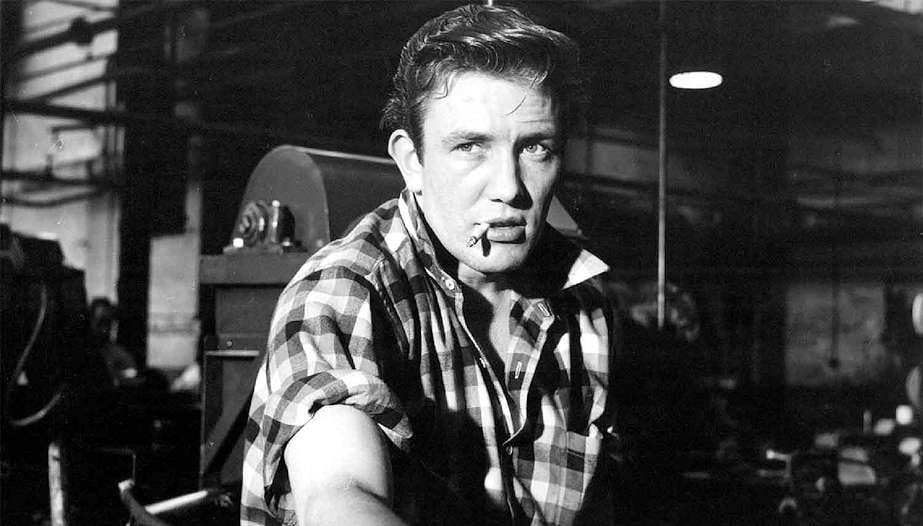‘Saturday Night and Sunday Morning’ at 60 – the enduring influence of the anti-hero
October 28, 2020

‘Saturday Night and Sunday Morning’, source
Most people who grew up in the noughties and spent their formative years reading the NME recognise the quotes, “whatever people say I am, that’s what I’m not”, as the title of the Arctic Monkeys’ 2006 debut album. Defiant, confrontational and a little bit churlish, the quote came to denote the band’s unique brand of infectious indie-rock and wry, kitchen-sink lyricism.
However, although the quote might sound like an early Arctic Monkeys lyric, it wasn’t. It was lifted directly from the 1960 film ‘Saturday Night and Sunday Morning’, directed by Karel Reisz. Based on Alan Sillitoe’s 1958 novel of the same name, the film is an abrasive, vivid vision of working-class life in post war Britain that has exerted an indelible influence over popular culture ever since. And, unbelievably, it’s 60 years old this October.
One of the earliest films of the British New Wave movement, ‘Saturday Night and Sunday Morning’ chronicles the life of Arthur Seaton, played by Albert Finney; a young, single man from Nottingham who works at a factory in a job he hates. Arthur is determined not to follow the conventional, civilised life that is exemplified by his parents; a quiet life of compliance with rules, working hard, getting married and watching television.
Instead, Arthur decides to battle against the system. He works only as hard as he needs to and takes no pride in his job. He gets drunk and behaves boorishly, to the disgust of his respectable working-class acquaintances. And rather than finding a nice girl of his own age, he’s having an affair with Brenda; a married, world-weary housewife who’s a decade his senior. The film’s opening sequence shows us Arthur working at his lathe whilst an internal monologue sets out his hedonistic and anti-authoritarian point of view. “All I’m out for is a good time”, Arthur tells us, “all the rest is propaganda.”
However, as the film progresses, it seems ever-more likely that Arthur will fall into the lifestyle he was determined to rebel against. The affair ends badly. His belligerent attitude alienates him from everyone else. When Arthur begins a relationship with Doreen, a beautiful and witty young woman, a conventional marriage seems to be on the cards. In the end, Arthur’s last act of defiance is to throw a stone at the housing estate his would-be wife wants them to live in. It’s hard to imagine Doreen and Arthur won’t end up imitating the lives of their parents, growing old and indifferent in front of a television set. His battle against the system seems to have amounted to nothing.
For the first time in British post war cinema, British working-class people were shown on screen without being either patronised or romanticised. Themes of violence, adultery and abortion are addressed with unflinching realism, and characters are fleshed out with colour and contradiction. Arthur is angry, but he’s not there to gain our sympathy. There’s no moral lesson to be learned in the end, nor is he a conduit for a political ideal. He’s a forceful, belligerent, flawed character, and his opinions are a tangle of contradictions. At a time when working-class characters in film were almost always reduced to one-dimensional tropes, he’s a real, complex human being.
An early embodiment of the working-class anti-hero, Arthur Seaton paved the way for some of British cinema’s best-known rebels. More than thirty years later, ‘Trainspotting’ portrayed the chaotic lives of a gang of Edinburgh heroin addicts. Like ‘Saturday Night and Sunday Morning’, ‘Trainspotting’ showed a section of society that had never been properly explored in film before. The iconic ‘Choose Life’ monologue, spoken by anti-hero Mark Renton at the beginning of the film, echoes the anti-authoritarian opening lines of ‘Saturday Night and Sunday Morning’. And ultimately, both protagonists end up conforming to the standards of society they had initially denounced.
Then, in 2007, Nottingham would once again provide a backdrop to a complex and fractured vision of working-class life in Shane Meadows’ ‘This is England’. Set in 1983, the film follows a young boy who is taken under the wing of a gang of friendly skinheads, before falling under the influence of a group of violent racists. Once again, the film shows us a group of complex working-class characters without veering into stereotype or caricature, and it never shies away from realism, no matter how uncomfortable.
By today’s standards, ‘Saturday Night and Sunday Morning’ isn’t a perfect film. Arthur’s laddish-ness hasn’t aged well, and the brilliant performances of the film’s two female leads, played by Shirley Anne Field and Rachel Roberts, aren’t served justice by a script that fails to fully explore their experiences and motivations. However, in its rich and complex vision of working-class life and its dynamic portrayal of an uncompromising anti-hero, ‘Saturday Night and Sunday Morning’ remains a cornerstone of British popular culture. 60 years on, it’s lost none of its potency.
Filed under: Film, TV & Tech
Tagged with: anniversary, Arctic Monkeys, British, cinema, film, Movie, Nottingham, pictures, Saturday Night and Sunday Morning, ticket, Trainspotting, working class



Comments